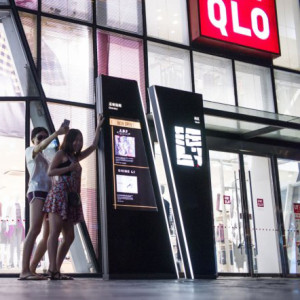A video of a young couple having sex in a fitting room of Uniqlo’s Sanlitun store in Beijing went viral on Wednesday and was deleted shortly after by censors. The discussion about this latest episode of “pornographic” private content leaks online that has continued in its wake, however, touches on issues that are gaining attention from the Chinese public.
The minute-long video, taken with a smart phone and showing a young couple — allegedly two college students — was spread on social media such as Sina Weibo and WeChat and viewed by millions of people before it was deleted on the order of the Cyberspace Administration of China (CAC) for violating the “socialist values.”
This isn’t the first time that explicit images and videos were leaked online in China despite the fact that the distribution of pornography is a criminal offense in the country. In 2008, more than a thousand of naked photos of several Hong Kong A-list movie and pop stars taken by singer-actor Edison Chen were leaked, which resulted in the arrests of at least ten people. In the Mainland China, a number of sex videos of government officials (e.g., Lei Zhengfu and several Fuzhou officials) and university professors (on a side note, in 2014, an appalling 57% of female college students in China said they had been sexually harassed by their professors) were leaked by their mistresses, whom have been hailed by many as a sort of heroines in combating corruption.
The Uniqlo’s sex video leak, however, is a different case in that it doesn’t involve celebrities or public/semi-public figures. This couple in the video are private persons and their sexual act appeared to be consensual, that is, with no apparent power imbalance or coercion implied as in the cases of officials and professors. Perhaps that was partly why rumors arose saying that the leak was either a marketing stunt by Uniqlo or the young couple’s attention seeking attempt. The Japanese fast fashion giant has since issued a statement denying its role in the distribution of the video. As to the young couple, their identities have not been officially disclosed, although attempts of revealing them, or what Chinese Internet users call “renrou,” have been made by hackers and several people’s personal information has been published online. In this Internet frenzy, one also sees ultra nationalist chatters advocating boycotting Japanese goods (as every time a Japanese company is involved in a controversy) and of course, slut shaming rhetoric springing from a self-righteous sense of morality and perhaps a kind of voyeuristic impulse.
No surprise there, but what’s worth noting is that in the midst of all this noise, there are thoughtful voices that demand our attention. For instance, in an article titled “Uniqlo and Lewinsky: the Price and Profit of the Shaming Economy” trending on the popular social media platform WeChat, author Wen Yan draws attention to Internet privacy and public shaming. Relating to Monica Lewinsky’s TED talk in March, she argues that in the age the Internet, there’s a certain “shaming economy” at work that allows corporations and individuals to profit at others’ expense:
The shaming economy is a tightly knit industrial chain, which, relying on an central event and by leaking private content via viral distribution, shames a particular individual while extracts value from public attention and profits from it. The price to pay in the shaming economy may be a young woman’s youth and reputation, but the profits are shared by leakers and certain groups. Everyone who has shared embarrassing photos and videos is a promoter of this economic chain, who amplifies the harm done to the victims and accumulates profits for those who benefit [from such distribution].
The author then challenges her readers: “Precisely because power can be easily put in your hand, will you chose to take the whip and wave it recklessly, or keep silence and think for yourself?”
On a different note, Dou Wentao of Phoenix TV, a Hong Kong-based Chinese television network, reflected on the phenomenon of ungrounded speculation of publicity stunt in the aftermath of the leak, attributing it to the seemingly ubiquitous presence of marketing and advertising in every slip of the Chinese social and private life and a growing fame-seeking culture. He said on his talk show:
Nowadays in China, many things in society perplex me. My judgment on this event is no judgment, because nothing is what it appears, and people’s thinking has become conditioned [accordingly]. Our producer, for instance, at once believed it was a publicity scheme. Have you noticed that nowadays, there isn’t any serious discussion, because all the discussion is about things being a media hype. This makes one not want to discuss anything.
Not without irony — since he himself is a high profile media personality — Dou expressed a deep anxiety rooted in the suspicion of the media in the grip of the government AND corporate power. Because of the lack of transparency, both in the sense of censorship and the aggressive marketing culture in today’s China, it’s very difficult for the public to construct a reality that corresponds accurately to the reality they live in as citizens and consumers. For years, the Chinese government has been cracking down “rumors” spreading on the Internet and failed, precisely because “rumors” are only a way in which people respond to the conditions of communication greatly shaped by, obviously, the government and the cut-throat materialistic culture it supports.
Like others preceding it, the Uniqlo viral video will die down from the media — perhaps sooner than we think — as we move on to a fresh scandal. Let’s hope that next time we’ll deal with it better, with a bit more humanity and decency.

